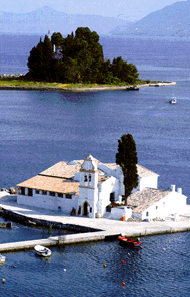| History of Corfu
 The
Ionian has been inhabited since prehistoric times and its
situation on the trade and invasion routes to and from the
Balkans, Italy and the Levant, has insured a rich and varied
historical tradition. The
Ionian has been inhabited since prehistoric times and its
situation on the trade and invasion routes to and from the
Balkans, Italy and the Levant, has insured a rich and varied
historical tradition.
The first
wave of Ancient occupiers of contemporary interest were the
Myceneans who have left significant traces particularly in
Thesprotia and Kefalonia.
During the
Classical period the region was home to several independent
city states (and their colonies) remains of which can still be
seen particularly in Corfu, Thesprotia and Kefalonia. Later,
these states joined one or other of the great leagues
organized by Corinth, Athens and Sparta resulting in the
Peloponnesian war breaking out off Southern Corfu in 431 BC.
During the
Hellenistic period the region was repeatedly threatened by
Macedonian invasions. King Pyrrhos of Epirus who had already
fought the Romans in Southern Italy was one of those to offer
resistance until his death in 272 BC.
 The Romans
finally began to occupy the region in 187 BC. The Romans
finally began to occupy the region in 187 BC.
When the
Emperor Constantine divided the Roman Empire in the 4th
century AD the Ionian became part of the Eastern (Byzantine)
Empire.
Despite
this, various parts fell under the control of a number of 6
powerful Frankish and Italian baronial families including the
Norman in the llth century and the Angevins in the l3th
century.
Eventually
however, by the late l5th century, two forces had emerged to
dominate the region; The Ottoman Turks and the Republic of
Venice. Despite brief periods of occupation by the Turks and
with the exception of most of Epirus the islands fell under
the control of Venice until the latter's defeat by Napoleon in
1797.
Then
followed a brief period of French occupation of the Ionian
islands until, in 1798, a joint Russian Turkish protectorate
was established. The Septinsular Republic, as it was called,
lasted until the islands were ceded to the French in 1807 by
the treaty of Tilsit.
The British
occupied the islands in 1809 and, following the Congress of
Vienna in 1815, set up the Union of the Ionian Islands under
their protection. (Septinsular, Eptanissa were the terms used
for the seven Ionian islands which included Kythera off the
South Western Peloponnese).
Following
the outbreak of the Greek war of Independence in 1821 which
received strong support from the Greeks of the islands, the
Turks were gradually driven northward. Britain returned the
Ionian Islands to the new Greek State in 1864 but it was not
until the end of the first Balkan War in 1913 that Epirus was
returned to Greece.
|